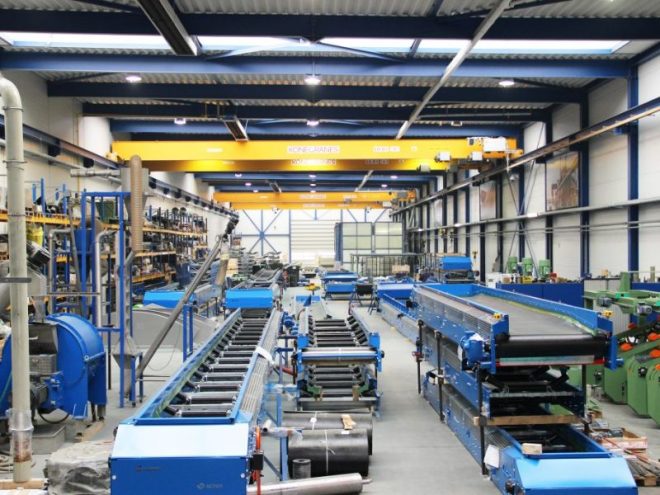The development and importance of industrial machines in modern production
In today’s urgency, industrial machines are essential in shaping economies and industries. These machines have revolutionized merchandise, ensuring efficiency, precision, and mass manufacturing. With the rise of cutting-edge manufacturing machines, industries have witnessed more productive work, reduced labor costs, and improved product quality. This blog delves into what Industrial Machines are, their sorts and features, the effect of automation and AI, and future developments inside the enterprise.
What Are Industrial Machines?
Industrial Machines confer with mechanical structures designed to perform specific features in industrial settings. These machines range from simple gear like drills and lathes to relatively state-of-the-art robotic arms and automatic manufacturing strains. They aim to beautify efficiency, velocity, and accuracy in manufacturing approaches, reducing the dependency on guide exertions while ensuring the steady product is pleasant.
Types and Functions of Industrial Machines
There are various Industrial Machines, every serving a unique purpose inside the production system. Below are a few key classes:
1. Material Handling Machines
These machines help transport, raise, and function raw materials and completed products within manufacturing facilities. Examples encompass conveyors, forklifts, and automatic guided automobiles (AGVs).
2. Machining Tools
These gear shape, cut, and refine uncooked materials into final merchandise. Examples are CNC machines (computer numerical control), milling machines, and laths.

3. Packaging Machines
These machines, used for sealing, wrapping, and labeling merchandise, ensure secure and environmentally friendly packaging. Examples include vacuum packaging machines and shrink-wrap machines.
4. Robotic Arms and Automation Systems
These machines carry out repetitive duties, such as welding, assembly, and painting. Robotics has become essential to trendy production machines, providing precision and efficiency.
5. 3D Printing Machines
Also known as additive production, 3D printers create complex elements and prototypes with high precision. They are used in aerospace, car, and scientific tool manufacturing.
6. AI-Driven Smart Machines
AI-integrated Industrial Machines analyze information, stumble on patterns, and optimize operations. These include predictive protection systems and excellent AI-powered manipulators.
Automation in industrial machines and AI’s influence
Technological progress includes condition -E -art design machines, more and more automation, and artificial intelligence. Here are a few ways AI and automation are reshaping the industry:
1. Enhanced Productivity
Automated Industrial Machines can function continuously, reducing downtime and growing manufacturing output. AI-driven structures similarly optimize overall performance by identifying inefficiencies and suggesting upgrades.
2. Precision and Consistency
AI-powered modern-day manufacturing machines ensure precision by minimizing human mistakes. They always produce notable products that meet strict enterprise requirements.
3. Cost Efficiency
Automation reduces complex work charges while increasing performance. AI-pushed Industrial Machines additionally contribute to predictive upkeep, preventing steeply priced breakdowns and reducing restore charges.
4. Customization and Flexibility
AI allows modern-day production machines to conform to unique production wishes quickly. Thus, businesses can customize merchandise more efficaciously without widespread reconfiguration.
5. Improved Safety
AI and robotics reduce the need for human workers in unsafe environments, minimizing workplace accidents and injuries.
Challenges in Industrial Machinery
Despite the blessings, using Industrial Machines comes with sure demanding situations:
1. High Initial Investment
Implementing cutting-edge manufacturing machines and AI-driven structures requires substantial preliminary funding, which may be challenging for small and medium-sized enterprises.
2. Technical Expertise Requirement
Operating and maintaining superior Industrial Machines requires skilled professionals, which requires nonstop teamwork education.
3. Cybersecurity Risks
With the growing reliance on linked modern manufacturing machines, the chance of cyber threats and data breaches becomes a huge issue.
4. Dependency on Technological Advancements
As the era evolves, industries should frequently replace their machinery to remain aggressive, which may lead to improved charges and the potential obsolescence of older machines.
Future Trends in Industrial Machinery
The future of industrial machines is fashioned using rising technology that holds the way to convert manufacturing processes. Key traits include:
1. Smart Factories and Industry 4.0
Integrating AI, IoT, and considerable data in modern manufacturing machines is central to smart factories, where interconnected systems talk seamlessly to optimize overall performance.
2. Sustainable Manufacturing
Eco-pleasant Industrial Machines that decrease waste reduce strength intake, and promote green production will gain traction.
3. Collaborative Robot (Cobot)
Cobots are designed to work alongside people, enhancing productivity and ensuring safety in business settings.
4. 3D printing development
The evolution of additive production will hold, permitting agencies to create complex components with more suitable performance and decreased material waste.
5. Edge Computing in Industrial Machines
By processing information closer to the supply, facet computing will decorate the performance of cutting-edge manufacturing machines, reducing latency and enhancing actual-time selection-making.
Conclusion
Industrial Machines have appreciably converted the manufacturing industry, using performance, price savings, and innovation. With the upward thrust of modern production machines, agencies can optimize manufacturing strategies, enhance exceptionality, and stay competitive in an evolving marketplace. However, demanding situations, including high fees, cybersecurity risks, and the need for skilled exertions, ought to be addressed to maximize the capacity of these technologies, such as automation, AI, and Industry 4.0 continues to boos. The destiny of industrial machines appears promising, paving the way for more innovative and sustainable manufacturing solutions.
Source:



